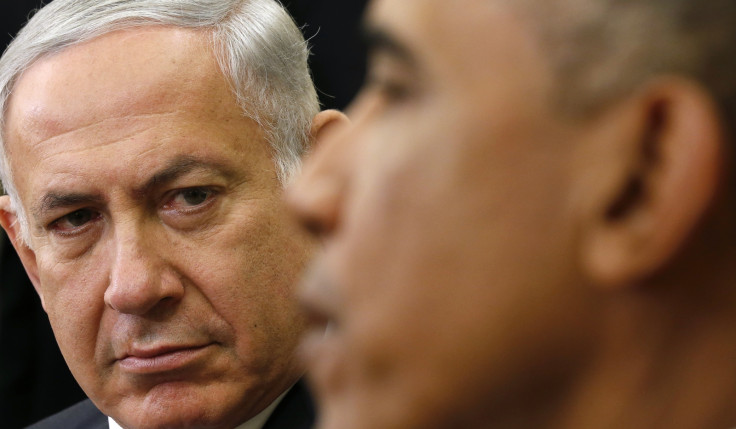Benjamin Netanyahu is alienating America's pro-Israel Jews with his US Congress speech

Benjamin Netanyahu has always been a man with more enemies than friends. But he is making new enemies of once supportive American Jews over his controversial speech to the US Congress, seen as a sleight against President Obama's White House, with which he has had several high-profile rows.
The Israeli prime minister, known colloquially as "Bibi", has clashed with Obama over the issue of a nuclear Iran. Obama has struck a dovish tone, urging diplomacy over the hawkish Netanyahu's penchant for military action and sanctions.
Iran is accused by some, including Israel, of wanting to develop a nuclear bomb. But Iran insists it only wants to develop nuclear technology for civil energy purposes.
Netanyahu is expected to use his speech on March 3 either to explicitly or implicitly attack the Obama administration's policy on Iran, which is driven by a set of nuclear talks with Tehran in order to reach a deal, and declare it a matter of "survival" for Israel. He insists his speech is not intended to disrespect Obama.
John Boehner, speaker of the House of Representatives in the US Congress, invited Netanyahu to speak to American legislators from all sides about the Iranian issue. But he did not inform the White House of that first, an unprecedented act which his critics say was underhand, unconstitutional and needlessly provocative.
Obama has refused to meet with Netanyahu because the latter is in the midst of an election campaign in Israel, in which he is seeking to strengthen his hardline conservative Likud party's hold over the Knesset after recently dissolving the coalition government he headed.
And many Jews in the US – especially those who vote Democrat – are annoyed that Netanyahu, the divisive leader of the only Jewish state in the world, has come to America in such a way that disrespects the nation's Democrat president.

Tipping-point
Some in the US are calling it a defining moment in the history of US-Israel relations, particularly for the Jewish communities in the country, many of which have long supported Israel and push for a strong bond between the two states.
"It's a tipping-point moment," Rabbi John Rosove, an outspoken liberal and head of Temple Israel of Hollywood, told the New York Times. "It's no longer the Israeli government, right or wrong. The highest form of patriotism and loyalty is to criticise from a place of love."
J Street, the liberal and pro-Israel Jewish-American organisation, has taken out adverts in the national media urging for Netanyahu's speech to be postponed, accusing him of using Congress as "a prop for your election campaign".
"Wading into partisan American politics behind the back of our elected president damages the US-Israel relationship," says a full page J Street advert in the New York Times.
But it isn't just liberals who Netanyahu has caused discomfort. The Anti-Defamation League (ADL), staunchly and immovably pro-Israel and one of Netanyahu's biggest advocates in the past, has urged caution over the speech.
Abrahm Foxman, national director of the ADL, has said it should be scrapped because of the outrage whipped up by his invitation to Congress and that this is becoming counter-productive for Israel.
"It's a tragedy of unintended consequences," Foxman told the Forward. "One needs to restart, and it needs a mature adult statement that this was not what we intended.
"It has been hijacked by politics ... Now is a time to recalibrate, restart and find a new platform and new timing to take away the distractions."

Some Democrats in Congress, even those who are pro-Israel, are refusing to attend Netanyahu's speech because of the furore around it. One of those people is Representative Steve Cohen, Democrat of Tennessee.
"I stand with Israel, always have stood with Israel, and always will, but this speech is not about Israel," Cohen told the New York Times. "Netanyahu is not Israel just like George W. Bush wasn't America."
Even Israel's former representatives in Washington are urging Netanyahu to cut his speech. Of six former Israeli ambassadors in the US questioned on the issue by Ynet Magazine, five said he should cancel.
"The issue is constantly making the headlines in the United States, and it's creating negative sentiment against Israel," Danny Ayalon, Israeli ambassador to the US from 2002 to 2006, said.
"Until now, Israel has enjoyed bipartisan support; that was our strength. And now Netanyahu is forcing the Democrats to choose between their president and a foreign prime minister. The Republicans feel uneasy too."
Killing the talks
The Israeli elections will take place on March 17. Netanyahu is keen to play up his tough guy image, that he is the only candidate who will unequivocally and forcefully defend Israel and its interests.
Netanyahu believes that the Iranians are not negotiating in good faith, and that any deal likely to be struck would be a bad one
Going to the US and pressing the case for a harsh stance with Iran, in the face of criticism from American allies, may only strengthen his domestic standing ahead of the election, even if it costs him political capital in the international arena by making more enemies in the White House.
But more than just his re-election, Netanyahu is looking to destabilise – perhaps even destroy – the US-led talks with Iran over the nuclear issue.
"Netanyahu believes that the Iranians are not negotiating in good faith, and that any deal likely to be struck would be a bad one," wrote Zack Beauchamp of Vox.
"He argues that their plan is to continue developing a nuclear weapon no matter what, while also dishonestly engaging in these talks in order to buy more time and to weaken the international coalition and sanctions against them [...]
"Obama and Netanyahu have disagreed over this since the most recent outreach between Washington and Tehran began in 2013. That disagreement has intensified. As a deal looks potentially more likely — the next deadline is in March, for a political framework — Netanyahu has become more assertive. This speech to Congress is his effort to kill the talks."
It's far too late for Netanyahu to cancel his speech, so it will go ahead. If he is to show any contrition, he may have toned down his original words in order to mitigate the uproar he has triggered in America.
But he still has Republican allies and, having already had poor relations with the Obama administration of which there is under two years left in the White House, he may sacrifice entirely – in the short term at least – his relationship with the president.
Instead he may be eyeing the 2016 presidential election when a Republican may, after eight years, return to the Oval Office and there can be a positive reset in the relationship between the White House and Netanyahu's government. It is a big gamble.
© Copyright IBTimes 2025. All rights reserved.






















